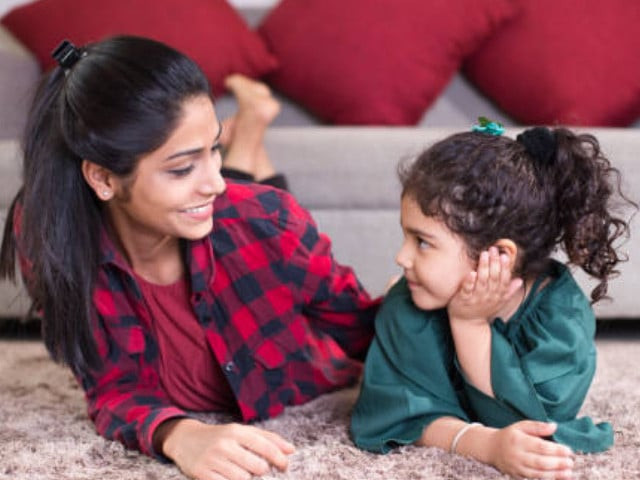The four words – Pakistani, millennial, woman, parent – serve as coordinates to locate the “presence” of several of my intersectionality on the map of life. But when taken into context, each word/label represents a separate journey of experiences for every woman my age.
I represent a faction that was born into privilege of sorts – in an upper-middle class family, to educated parents, who lives in a big city like Chicago – along with six million other people at the time. Every woman belonging to this faction has lived through a time that has not only seen technology flourish but has also seen the stature of woman and womanhood change manifold.
The ‘girl’ in us was indoctrinated, the ‘millennial’ learnt and the ‘parent’ is still in the process of unlearning. Finally, the ‘Pakistani’ in us is in an emotional turmoil and has a scattered sense of identity. In my opinion, primarily because as women born and raised in a dogmatic society, we cannot just dissolve into one.
As I parent my daughter, I find myself picking a “Frozen” for every “Sleeping Beauty” that I was bought as a kid. For every fragile Barbie that I was gifted, I present my daughter with an equally fierce Optimus Prime. The sons are now, for a lack of better word, ‘allowed’ to play chef, and rightly so, which in our time was downright abhorred. And while it may seem as the obvious thing to do, in this day and age (of woke liberalism), there is also a part of me and my faction that finds it hard to explain the concept of gender fluidity to future generations. As Pakistani millennials, we struggle with drawing the defining line between fluidity of societal gender roles and the metamorphosis of gender identity. Conceptually, the two are distinct, but in practical terms, our millennial minds might fail to translate it into core values while raising children born into the age of Artificial Intelligence (AI).
It was but second nature to understand unsaid and untold yet differing curfew times for teenage boys and girls in those times – things that few of us questioned. And those who did were labelled as a certain character. Now as a grown woman, I recognise the urge and need to protect the so-called “weaker sex” from the gnawing jaws of untamed men; I feel distraught at being robbed of the opportunity to err and learn. We can possibly encompass some men our age who were raised protected as well. Thus, giving rise to a generation of parents who have so much left to discover within themselves, while also expected to raise another human.
Much as the generation before us struggled to get women out of home-schooling into formal education, rendering the first women graduates of many kinds in many families, today’s woman is caught in the conundrum of prioritising family or career. Today, in the majority of homes, the ideal two-income household exists on the grounds that women take on both the traditional and modern roles. Nonetheless, even the ones with the more egalitarian approach still grapple with infamous parental guilt, popularly marginalised as “mom guilt”, a term that rages many storms in my mind (better to be addressed at a later time). And so, what may seemingly appear as a “picture perfect,” “instagrammable” life, often comes at the cost of severe mental trauma.
Those of us who are able to break free of the chains of mental confines eventually get absorbed into another rabbit hole of striking the balance between how much freedom, how much struggle and how much luxury to provide to our future generation. A generation that was born in the age of instant gratification and where knowledge of all sorts, both good and bad, is a click of a thumb away. While we juggle with this thought, we are often reminded of the stories narrated to us by our parents, of their miles-long commute on foot to get to where they stand today.
Navigating through existence has never been easy, but I would argue our times are the hardest. We struggle with many rights and wrongs, tussle with nonconformity and yet fancy some degree of traditionalism.
Kahlil Gibran aptly sums our struggles timelessly, in his book The Prophet:
“Your children are not your children.
They are the sons and daughters of life’s longing for itself.
They come through you but not from you,
And though they are with you yet they belong not to you.”



COMMENTS
Comments are moderated and generally will be posted if they are on-topic and not abusive.
For more information, please see our Comments FAQ